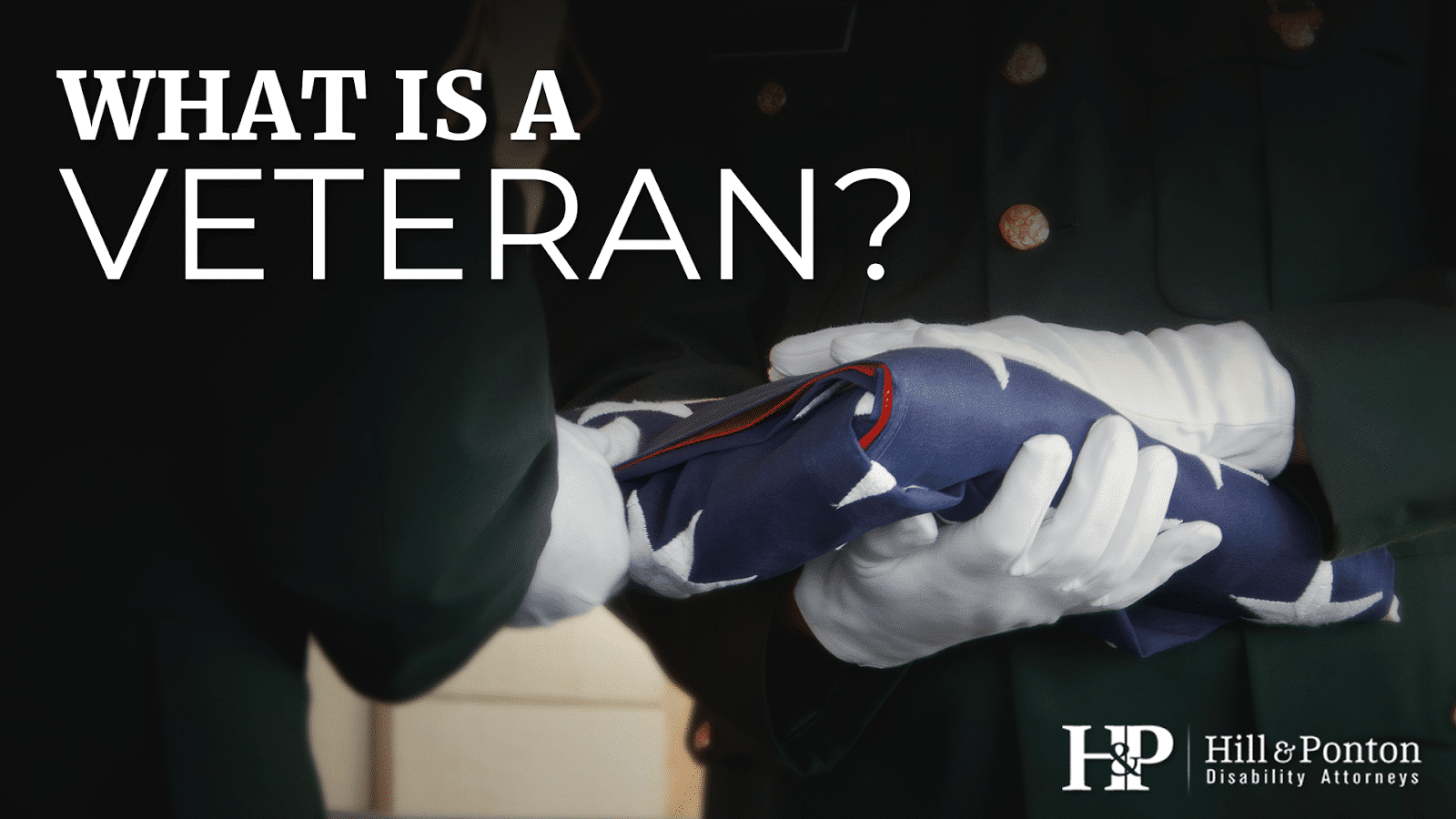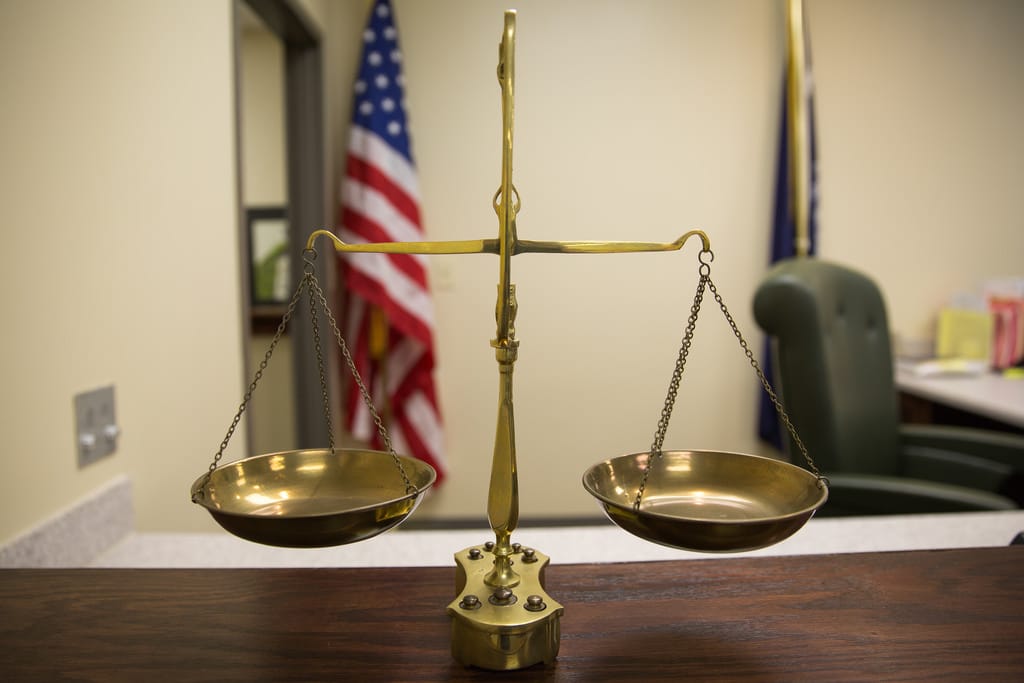In order to receive benefits through the U.S. Department of Veterans Affairs (VA), individuals must be classified as a veteran.
But how does the VA define the term “veteran”?
Whether they served in the Vietnam era or more recently in Afghanistan, all war veterans are classified under the same definition. This guide will break down how the VA determines who is a U.S. military veteran.
What is a U.S. Veteran?
The first step in determining whether a person is qualified for VA benefits is determining whether the person meets the VA’s definition of “veteran.” While this may seem like a simple question, there are some nuances that are important to understand. The VA defines the word veteran as “a person who served in the active military, naval, or air service, and who was discharged or released therefrom under conditions other than dishonorable.”
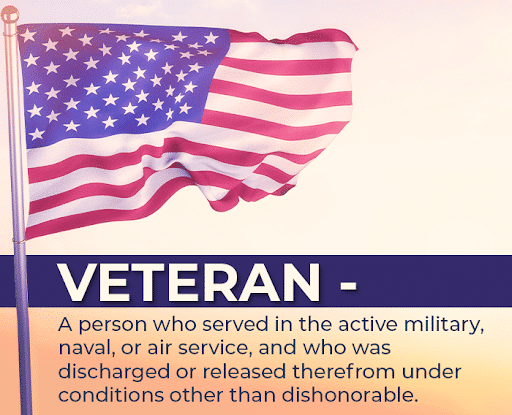
For VA purposes, when it comes to the definition of a veteran, active military, naval, or air service includes not only the United States Army, Navy, Marine Corps, Air Force, and Coast Guard service, but also a member of the Reserves, Air or Army National Guard, or military academies in certain circumstances. Military service also includes commissioned officers in the Public Health Service on full-time duty, commissioned officers of the National Oceanic and Atmospheric Administration or Environmental Science Services Administration on full-time duty, and service by certain civilians whose work supported military operations and the armed forces during specific periods of conflict or period of war.
If your service qualifies as military, naval, or air service, the next step is to determine whether that service was “active” service. Active duty service means full-time duty. For Reservists and National Guard members, they must have been called up to active duty for federal purposes. Federal service includes periods during which a National Guard member is ordered into federal service by the President or to perform specified training exercises.
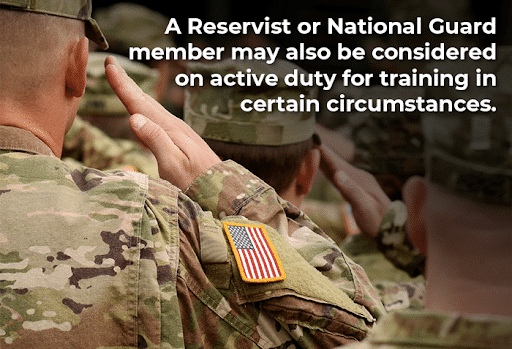
A Reservist or National Guard member may also be considered on active duty for training in certain circumstances. A period of active duty training is considered active military, naval, or air service if “the individual concerned was disabled or died from a disease or injury incurred or aggravated in line of duty” during the period of active duty for training.
There are also circumstances in which a person qualifies as a veteran during “inactive duty for training,” such as if he or she was disabled or died from an injury incurred or aggravated in the line of duty or from an acute myocardial infarction, a cardiac arrest, or a cerebrovascular accident that occurred during training. Note that the word “disease” is not included in these service requirements, which means that there is a more narrow set of circumstances in which a person qualifies as a veteran for inactive duty for training.
Condition of Discharge
The second factor the Department of Veterans Affairs considers when determining whether a service member qualifies as a veteran, thus eligible for veterans’ benefits, is their official discharge or release “under conditions other than dishonorable.” This information is available in the veteran’s service records.
It is important to note that the VA’s use of conditions other than dishonorable does not have the exact same meaning as the terms used by the military to characterize a person’s discharge. However, there are two types of discharges that the VA will automatically consider to be a certain type of discharge:
1. The first is a dishonorable discharge because such a discharge can only be issued by a general court-martial, which is a statutory bar to benefits.
2. The second is an entry-level separation administrative discharge, which is a discharge under conditions other than dishonorable and qualifies the person as veteran.
But aside from these two situations, it is not possible to merely rely on the military’s characterization of discharge to determine whether an individual was discharged under conditions other than dishonorable. Instead, you must look to whether there is either a statutory or regulatory bar to benefits.
There are six statutory bars to benefits. If a person was discharged for one of the statutory bars, he or she is not eligible for VA benefits even if his or her discharge is characterized by the military as honorable or under honorable conditions.
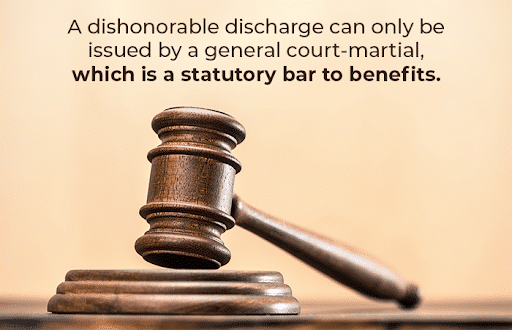
The six statutory bars to benefits are:
- Discharge as a conscientious objector who refused to perform military duty or refused to wear the uniform or otherwise refused to comply with lawful orders of a competent military authority
- Discharge or dismissal by reason of a sentence of a general court-martial
- An officer resigning for the good of the service
- Desertion
- Discharge as an alien during a time of hostility
- Discharge under other than honorable conditions issued as a result of absence without official leave (AWOL) for at least 180 continuous days.
Note that there is an exception to the bar to benefits for AWOL. The statutory bar does not apply if the VA makes a factual determination that there were “compelling circumstances to warrant the prolonged unauthorized absence.”
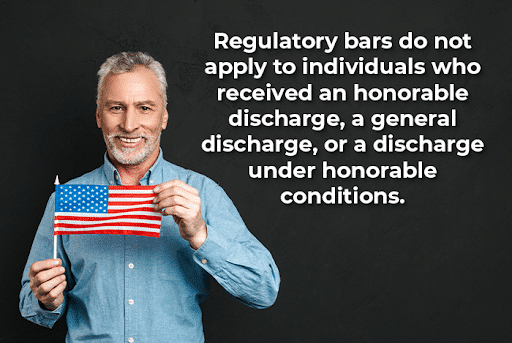
There are also regulatory bars to benefits that apply under certain circumstances. Note that these regulatory bars do not apply to individuals who received an honorable discharge, a general discharge, or a discharge under honorable conditions. The VA will consider a discharge from a special court-martial, an undesirable discharge, or a discharge under dishonorable conditions to be “issued under dishonorable conditions” if the discharge was based on conduct that falls into one of the following categories: accepting an undesirable discharge or discharge under other than honorable conditions to escape a trial by general court-martial; mutiny or spying; an offense involving moral turpitude; willful and persistent misconduct; and homosexual acts involving aggravating circumstances or affecting the performance of duty. Note that a person who receives an undesirable discharge or other than honorable discharge that is subject to a regulatory bar is still entitled to VA health care for a disability that was incurred or aggravated during service.
An important thing to remember is that it is possible for a person to qualify for veteran status for one period of service, but not for a prior or subsequent period of service. In such cases, it is necessary to show that the disability the veteran is claiming resulted from the period of service where he or she qualifies as a veteran.
Have Questions About Veterans’ Benefits?
If you spent time in active military service and believe you are eligible for veterans’ benefits, the team at Hill & Ponton is available to evaluate your case. Our attorneys will ensure that the VA is evaluating your eligibility in accordance with federal law, so you can obtain the benefits you deserve. Whether you served as a reserve member or combat veteran, contact us today for a free case evaluation.
